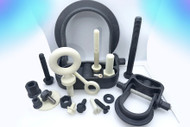Plastic Fasteners are Strong
Jun 18th 2024
Plastic parts are generally not known for their strength. Consumers often choose plastic parts for their good chemical and acid resistance. And also the fact they do not conduct electricity and can perform well in the presence of water. However, despite this reputation, there are plastic materials that have all of the better-known characteristics of plastics and yet rival the strength of metals. Plastics such as TPUIsoplast®, FR4/G10, and Polyarylamide or PARA are exceptionally strong plastics.
Does your application require strength as well as non-corrosive and non-conductive properties? Check out the top three strong plastics for fasteners and custom parts.
1. Thermoplastics Polyurethane TPU Isoplast®
Thermoplastic Polyurethane is an impact modified amorphous polymer*** with the chemical resistance of crystalline resins. TPU has a low uniform shrink rate which allows minimal creep*. TPU 40% glass filled plastic fasteners are significantly lighter than the same metal parts. With an ultimate tensile strength of 27,000 psi (186 MPa), TPU 40% glass-filled is like aluminum. Also it has strength, water and chemical resistance, low creep and UV resistance. Thus TPU 40% glass fiber is an ideal material for plastic fasteners such as hex bolts, hex nuts and TPU screws. It is also used in applications such as internal scaffolding products, beam clamps, pipe hangers, post bases, pipe clamps, clevis hangers, channel nuts, U-bolts, and more.
TPU 40% glass filled is sold under the brand name Isoplast®, among others.
2. FR-4/G10
FR-4/G10 is a composite material made up of woven fiberglass cloth and an epoxy resin. This combination gives the laminate good strength to weight ratios. Typical physical and electrical properties of FR-4 are expressed by LW (length wise, wrap yarn direction), and CW (cross wise, fill yarn direction). LW and CW refer to fiber orientations that are perpendicular to each other. With a tensile strength of 45,000 psi (310MPa), FR-4 plastic parts compare well to brass and aluminum. Aluminum (Grade 6463-T6) has an ultimate tensile strength of 35,000 psi (241 MPA). While the number for free machining brass (Grade C3600) is 50,000 psi (345 MPA).
Also FR-4 plastic parts are flame resistant. Flame resistant means that the parts are self-extinguishing according to the UL 94 test. G10 plastic parts are not flame resistant. Thus they are no longer commonly used, although they are still used in applications where thermal destruction of the material is desired. FR-4 epoxy resin often uses bromine, a halogen, to give the material a UL 94 V-0 flammability rating. With flame retardant and near zero water absorption, FR-4 plastic fasteners retain their high mechanical strength and electrical insulating qualities in both dry and humid conditions. FR-4 is not available in an injection molding grade but rather in sheets, plates and rods.
FR-4 is the insulating backbone of printed circuit boards (PCBs). Also it is also used for screws, bolts, nuts, switches, standoffs, threaded rod, transformers other parts that require strong plastics.
Ultimate Tensile Strength
| Material | Mpa | PSI |
| FR-4/G-10 | ||
| PARA (50% glass-filled) | ||
| TPU (40% glass-filled) | ||
| Magnesium (Grade HK31A-T6) | ||
| Brass (Grade C3600) | ||
| Zinc Alloy | ||
| Aluminum (Grade 6463-T6) | ||
| Steel |
3 . Polyarylamide (PARA)
Polyarylamide (PARA) contains a base resin that has lower and slower water absorption than typical polyamides. This resistance to water absorption is found in PARA’s semi-aromtic structure. Polyarylamide compounds containing glass fiber result in plastic fasteners that have very high rigidity, excellent surface quality, extremely low creep* and high dimensionally stability. Also PARA material containing 50% glass can stand up to a variety of chemicals including those used in the automotive industry.
PARA 50% glass-filled plastic parts have an ultimate tensile strength of 34,000 psi (230MPa). These parts made of strong plastics are often used to replace metal. It is available in a wide variety of colors. Thus PARA is often used in covers for cell phones and other electronic devices. Also, it is used in aircraft and automotive applications as well as in furniture, small appliances, power tools, camera parts, gears, handles, hinges, and knobs.
PARA 50% glass-filled is sold under the brand name of IXEF®, among others.
*Creep is the tendency of a solid material to move slowly or deform permanently under the influence of stresses.
**An impact modified polymer is one whose impact resistance and toughness have been increased by the incorporation of the phase microdomains of a rubbery material.
*** An amorphous polymer has a molecular structure that lacks a definite repeating form.
Reprinted from https://craftechind.com/top-3-strong-plastics/ with express written permission

